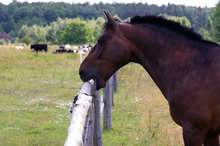A study at Hartpury College in England turned up a cribbing-associated fact that may affect the health of horses that engage in cribbing activity. The study looked at patterns of night sleep in horses that cribbed and others that did not crib. The horses’ behavior was recorded on videotape by unmanned cameras from 10 p.m. to 6 a.m. for five nights.

Horse cribbing on fence
No one knows for sure why horses begin cribbing behavior, but it has been shown that dopamine (a neurotransmitter that helps control the brain's reward and pleasure centers) levels are higher in cribbing horses than in non-cribbers.
Analysis of the tapes showed that cribbers had a 48% reduction in standing sleep time compared to non-cribbers. This kind of sleep is a slow-wave type and is similar to the sleep that occurs when horses are lying down in sternal recumbency with legs folded, neck and shoulders upright.
When a horse lies flat on its side to sleep, it is in a non-slow-wave type known as paradoxical sleep. The study showed no significant difference between cribbers and non-cribbers in any sleep type except for standing sleep.
A horse that indulges in cribbing, or crib-biting, is showing an oral stereotypic behavior that involves setting its upper front teeth against a solid object such as the edge of a fence or stall wall, arching its neck, and pulling back while making a grunting sound. No one knows for sure why horses begin the cribbing behavior, but it has been shown that dopamine levels (a neurotransmitter that helps control the brain's reward and pleasure centers and also helps regulate movement and emotional responses) are higher in cribbing horses than in non-cribbers.
Though the role of sleep is incompletely understood in horses as well as in other species, the findings of this study point out that sleep in cribbing horses may be outside the pattern that is considered normal for other horses.
Since Dopamine is a brain chemical that induces a pleasurable or euphoric mood, cribbers may continue the habit because it is rewarding and pleasurable. Unfortunately, the drawback is that horses may come to prefer cribbing to eating, exercising, or sharing social time with their pasture mates.
Horses that are confirmed cribbers sometimes lose weight, have an above-average number of colic episodes, and may develop excessively worn upper incisors, affecting their ability to graze.
It is not known whether cribbing horses are actually sleep-deprived, as they may be able to make up the lost night hours of standing sleep during the day. If the behavior does reduce total hours of sleep, it is also not known what effect, if any, is produced on the horse’s behavior or ability to learn or perform.
Another unknown is whether the horses can’t sleep for some other reason and begin to crib because of stress from sleep deprivation, or whether they choose to crib at night and therefore keep themselves from sleeping.
Jane Williams, who led the study, presented the results at the International Society for Equitation Science Conference in 2012. She indicated that if cribbing horses actually do get fewer hours of slow-wave sleep than other horses during a 24-hour period, this could have an impact on their welfare because this type of sleep is thought to allow repair and restoration of physical and mental systems.
Though the role of sleep is incompletely understood in horses as well as in other species, the findings of this study point out that sleep in cribbing horses may be outside the pattern that is considered normal for other horses.
Learn more about Cribbing Management
